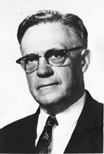Brian F Pfleger
University of Wisconsin-Madison
Department of Chemical
and Biological Engineering
Integrating Systems and Synthetic Biology for Engineering Chemical Production in Bacteria
,Abstract
Finding a sustainable alternative for today's petrochemical industry is a major challenge facing chemical engineers and society at large. To be sustainable, routes for converting solar energy into organic compounds for use as both fuels and chemical building blocks must be identified, understood, and engineered. Advances in synthetic biology and other biological engineering disciplines have expanded the scope of what can be produced in a living organism. As in other engineering disciplines, synthetic biologists want to apply a general understanding of biology to construct complex systems from well-characterized parts. Once novel synthetic biological systems (e.g. enzymes for biofuel synthesis) are constructed, they must be engineered to function inside living cells without negatively impacting the host's physiology. In most cases first generation systems fail to meet this goal. My group uses systems biology tools to identify metabolic, regulatory, and/or physiological barriers which often can be overcome with metabolic engineering strategies. In this talk, I will describe how we have combined synthetic biology and systems biology to develop strains of bacteria that produce compounds derived from fatty-acids starting from sustainable feedstocks to engineering efforts. Our work has combined functional genomics analysis, synthetic biology construction techniques, bioinformatics, and metabolic modeling to metabolically engineer superior microorganisms. We have tested our strains in media formulated with biomass-derived sugars and are developing photosynthetic microorganisms to by-pass the biomass middle man.
Bio
Brian received his bachelor's degree in Chemical Engineering from Cornell in 2000. Brian earned his PhD in Chemical engineering at the University of California-Berkeley under the supervision of Jay D. Keasling in 2005. Brian's thesis research focused on developing methods of controlling gene expression in bacteria that could be applied to enhancing the biosynthesis of pharmaceuticals. This experience trained him to design, construct and evaluate strains of Escherichia coli for the production of small molecules, by integrating synthetic and systems biology. After graduating, he accepted a postdoctoral fellowship in the laboratory of David H. Sherman at the University of Michigan, where he studied how six Bacillus anthracis enzymes assemble a natural product essential for iron acquisition and pathogenesis. Research in the Sherman lab exposed him to the combinatorial nature of natural product biosynthesis and taught him how to work with these novel enzymes. Brian is currently an Assistant Professor of Chemical and Biological Engineering at the University of Wisconsin-Madison with appointments in Biomedical Engineering, the Microbiology Doctoral Training Program, and the graduate program in Cell and Molecular Biology. His research interest is engineering sustainable chemical production using synthetic biology. Brian is a project leader in the Great Lakes Bioenergy Research Center, one of three national DOE research centers, and his work has been recognized with young investigator awards from 3M and the Air Force Office of Scientific Research.
Please see Dr. Pfleger's website here.

